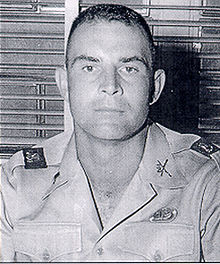Charles Beckwith
Charles Alvin Beckwith (* 22. January 1929 in Atlanta , Georgia ; † 13. June 1994 ), known as Chargin 'Charlie (dt. Demanding Charlie ), was a Colonel of the US Army and Vietnam veteran , in 1977 the US Special Forces Delta Force founded. Although he is remembered as an excellent soldier within the community of the military's special forces, he is mostly only associated in the American public with the failed attempt to rescue the US hostages in the US embassy in Tehran ( Operation Eagle Claw in Iran 1980). .
Early years
Beckwith was born in Atlanta , Georgia , in 1929 and was an excellent football player during his high school years. He got a ROTC scholarship and went to the University of Georgia . In 1952 he was awarded the officer license and was appointed 2nd lieutenant .
Military career
Green Berets and Vietnam
1955 Beckwith was transferred to the 82nd Airborne Division, where he took command of a support company of the 504th Airborne Infantry Regiment. Two years later he moved to the Special Forces ( Green Berets ) and in 1960 he was transferred to Vietnam and Laos as a military advisor . During the Vietnam War , he served in the top secret Military Assistance Command, Vietnam - Studies and Observation Group (MACV-SOG) , a multi-armed forces special task force of the Military Assistance Command, Vietnam for unconventional warfare . This carried out special operations behind enemy lines throughout the Southeast Asian region.
Training at the SAS
In between, in the early 1960s, Beckwith moved to the Special Air Service , the best and most experienced special unit in the British military, as an exchange officer . During this time he became familiar with the special techniques of counter-terrorism and anti-guerrilla tactics, as well as command warfare . Very impressed by the British know-how, he returned to Vietnam after this use and from then on let this knowledge flow into his area of responsibility.
As the commander of the ultra-secret unit Project Delta , he was wounded so badly at the end of 1965 that there was really no hope, but thanks to his very good constitution he survived and was able to recover completely. He then left Vietnam and took on a training class at the Ranger School in Fort Benning in the US state of Georgia , where he revolutionized the training program, which was still based on tactics from World War II , by using his tactical experience from the exchange time at the SAS and incorporated his war experience into the curriculum.
Delta Force and Eagle Claw
The Delta Force was set up in 1977 as a special unit with a focus on counterterrorism and hostage rescue, the first commander of which was Beckwith. Their first mission, the planned liberation of US hostages who were held captive in Tehran ( Operation Eagle Claw ), failed miserably due to coordination problems between the individual units involved and helicopter failures due to insufficient training of the pilots for special operations of this kind.
As a result, the 160th Special Operations Aviation Regiment (Airborne) was set up, an Army Aviation Unit specializing in special operations , which from then on ensured the worldwide air transport of all special operations forces of the Army.
The structure and operational doctrine of the Delta Force are essentially based on the experiences Beckwith had gained at the SAS.
Last years and death
After leaving the Army, Beckwith worked as a private security advisor for several years.
After his death on June 13, 1994, he was buried in Fort Sam Houston National Cemetery (Fort Sam Houston National Cemetery) in San Antonio , Texas .
Awards
Beckwith received the following awards during his military career:
- Distinguished Service Cross
- Silver Star with Oak Leaf Cluster
- Legion of Merit
- Bronze star
- Purple heart
literature
- Eric Lee Haney , Delta Force Instructor from the very beginning and author of the book Eric L. Haney: Delta Force - On the Action Against Terror. A soldier of the American elite unit reports. Goldmann, Munich 2003, ISBN 3-442-15215-1 .
- Charles Beckwith. Delta Force: The Army's Elite Counterterrorist Unit , Avon Books, 2000, ISBN 0-380-80939-7
| personal data | |
|---|---|
| SURNAME | Beckwith, Charles |
| ALTERNATIVE NAMES | Beckwith, Charles Alvin |
| BRIEF DESCRIPTION | American soldier in the US Army and Vietnam veteran and founder of the US special forces unit Delta Force |
| DATE OF BIRTH | January 22, 1929 |
| PLACE OF BIRTH | Atlanta , Georgia |
| DATE OF DEATH | June 13, 1994 |
